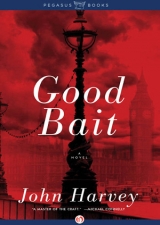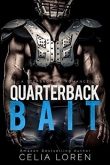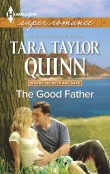
Текст книги "Good Bait"
Автор книги: John Harvey
Жанр:
Триллеры
сообщить о нарушении
Текущая страница: 5 (всего у книги 19 страниц)
12
Cordon sat in a room that was squat and square, old copies of British Transport Police press releases on the walls. Whatever mode of transport Londoners choose, a team of dedicated officers will be there to reassure them and tackle crime: the Chief Operating Officer of London Underground. Cordon felt reassured. The air in the room was stale. Somewhere on the other side of the door were banks of screens, computers retrieving and storing images from every part of the network.
When he’d woken that morning in the unfamiliar surroundings of Jack Kiley’s flat, it had been some moments before he realised where he was, remembered exactly why he was there. Instead of the anguished cry of seagulls, the slow acceleration of buses away from the traffic lights on Fortess Road, JCBs from the nearby Murphy’s yard rumbling their way to work.
‘Help yourself,’ Kiley had said. ‘Whatever you can find.’ Shown him where he kept the coffee, the tea. If you stood in the centre of the kitchen, you could touch all four walls without having to move your feet.
They’d sat up late the night before, after a meal at the Blue Moon cafe along the street. Won ton soup, drunken noodles. Thai beer. Kiley talking about an investigation, tracking down a soldier from the Queen’s Royal Lancers who’d gone AWOL rather than rejoin his regiment and return to Iraq. This a few years back, but preying still on his mind.
Kiley had got involved, unwillingly, through someone he’d befriended some time before; spoken to the soldier’s mother, distraught, patted her hand, made promises he couldn’t hope to keep.
There were children, kiddies, a wife who’d moved them away to another town and filed for divorce. A soldier from the Queen’s Royal Lancers with a rifle and ammunition; a man who’d seen things, likely done things most people would blank from their imagination.
He took them, wife and children, the youngest only three. Kiley’s face tight, remembering. When they eventually found them, they were camped out in woodland, police helicopter circling overhead. What he’d intended had been unclear, even, Kiley suspected, to himself; his wife frightened he would kill them, the children and herself, anything rather than lose them. Saying it between sobs, over and over.
It was himself he killed in the end, a single bullet to the head. Professional. The children crying, screaming.
‘Something like that,’ Kiley began, ‘you never …’ then stopped and ordered another beer instead.
Back at the flat, they watched the news. Two more dead from roadside bombs in Afghanistan. More snow forecast for the south-east, temperatures dropping. Senior Scotland Yard officer to come up on trial: conspiracy to pervert the course of justice.
‘This woman,’ Cordon said. ‘Jane. Serious?’
‘Schoolteacher. Local primary.’
‘Serious, then.’
Kiley poured them both another shot of whisky. Some of the good stuff, Springbank, cask strength, twelve year old, present from a grateful client. Mose Allison in the background, ‘Everybody Cryin’ Mercy’, one of Kiley’s favourites. Cordon had made him play the Mulligan beforehand: a tune he couldn’t prise from his mind.
‘You ever read those stupid instant interviews in the paper?’ Kiley asked. ‘Q amp; A with some celeb. “Ever said ‘I Love You’ and not meant it?’”
‘That’s what it’s like? With Jane?’
Kiley shrugged. ‘Sometimes.’
‘Price of a bed,’ Cordon said.
The music stopped. Neither man moved. Shrill laughter from the street outside.
‘The girl you’re looking for …’
‘Letitia.’
‘Yes. You ever …?’
‘It’s not like that,’ Cordon said quickly. A little too quickly.
Kiley shook his head. ‘One way or another, it always is.’
Cordon didn’t argue.
Tossing back the rest of his glass, Kiley got, with surprising agility, to his feet. ‘The morning, then.’
‘Yes. Yes, sure.’
Cordon watched him walk across the room, only the slightest limp, the smallest sign of the injury that had ended his footballing career.
The door to the room where Cordon was waiting opened and a man came in, sallow faced, slouch shouldered, the beginnings of a belly, too many hours behind a desk.
‘Trevor Cordon?’
‘Yes.’ Rising.
‘Bob Rowe.’
They shook hands.
‘Maxine Carlin, you’re a relative?’
‘Not exactly.’
‘Jack said related.’
‘Close. You could say we were close.’
Rowe continued to look at him, uncertain.
‘Daughter aside,’ Cordon said, ‘there’s really no one else.’
‘And the daughter?’
Cordon shrugged. ‘Who knows?’
Another moment’s hesitation. ‘Okay, you’d best come through.’
A bank of screens dominated one wall; individual screens at intervals along long rows, staff intent, heads inclined, some images changing – another camera, another angle – others remaining focused on seemingly empty tunnels, empty walls.
Rowe indicated an empty chair and Cordon slid it across.
‘Till we started using this new system,’ Rowe said, ‘storing all the imagery that comes through just wasn’t possible. Fifty, sixty per cent at best. And retrieving what you did have, that wasn’t so easy, either. Things would get lost. But now …’ He clicked once, twice, a third time and, less than a hundred per cent sharp, an image flicked into place. ‘Okay. Finsbury Park station, Piccadilly Line, West Platform, 9.31 in the morning. Tail end of the rush hour. Still busy, as you can see.’
Cordon leaned forward.
‘There she is now, your Maxine, just coming on to the platform, looking round.’
Cordon saw a figure that could indeed be her, three-quarter-length coat, scarf; the face, when she turned, darkened by shadow.
‘Here now, you see, another camera. She’s looking across the track, probably checking her destination. And then she starts to walk away.’
A dozen steps and she was lost to sight, a small surge of passengers moving in behind her, blocking her from view.
‘And this,’ Rowe said, as the angle changed, ‘is where we pick her up again. More or less on her own for what? Twenty, thirty seconds, before other people come into view, result of an announcement, most likely, asking customers to use the full length of the platform. Several people there now, you see, quite close …’
Cordon sees a young couple, both smartly dressed, partly facing: the woman has long, shoulder-length hair that in the picture is bleached almost white; the man bends his head towards her, says something close to her ear that makes her smile. A businessman behind them, middle-aged, striped suit, tie, briefcase, folded newspaper. Financial Times. Cliche. Another man, younger, headphones, laptop under one arm. Several others towards the edges of the frame, moving forward as the train approaches, crowding in, virtually impossible to distinguish one from another.
‘Let me see her face,’ Cordon said.
The image stops, reverses, zooms in, then freezes. The face is pinched, eyes small, dark, uncertain, and Cordon thinks of something trapped, cornered.
‘Move it on, just a fraction.’
For a moment, hardly more, Maxine seems to be looking directly into the camera, head raised, mouth opening as if to speak … Then, as if in slow motion, she turns away, towards the track, the train; a movement, blurred, down across the frame as she falls and she’s gone.
A dark space where she had been standing.
The camera shows a bustle of movement in the wake of her going, the white blur of faces, a mouth opening in a shout or scream, someone pointing. The young woman has buried her face against her partner’s chest and he appears to be stroking her long hair.
‘That’s it?’
‘That’s it.’
Cordon sat back with a slow release of breath. ‘See it again?’
Nothing changed.
In all of three viewings, nothing changed. At the end of each, Maxine Carlin was still dead under the train.
Cordon’s shoulders ached.
‘I looked at the report before you came,’ Rowe said, swivelling in his chair as the screen went blank. ‘Read through the witness statements, fifteen of them. People who were on the platform that morning, when the incident occurred. All of those you’ve just seen. Most, anyway. One or two we couldn’t trace. Some of them claim to have noticed her before it happened. Not many, but a few. Standing worryingly close to the platform edge, one said. Nervous, said another, as if she wasn’t sure where she was going. If this was her train. One thing they all agreed on, those who were close enough to see: the moment before the train arrived she either jumped or fell.’
‘No suggestion that she was pushed?’
‘None.’
‘Not even accidentally? Passengers eager to get on the train. Find space. End of the rush hour, like you said.’
Rowe shook his head. ‘If you’re looking for some other explanation, something to hang on to, maybe there’s an outside chance. But after what you’ve just seen, the evidence as it stands …’ On his feet, he offered a hand. ‘I’m sorry.’
Cordon nodded. ‘Thanks for your time.’
Rowe led him through towards the outer corridor, the stairs. ‘Tell Jack he owes me one, okay?’
13
Not expecting overmuch, Cordon sought out Letitia’s last known London address, culled from the scrap of paper Maxine had thrust into his hand. A brief walk from where she had met her death.
Rain fell, almost invisibly, from a sky of palest grey. Paving stones slick and slippery beneath his feet.
The house was midway along a residential street, all of them double fronted, once grand, now shabby, down at heel. Both upper floors of the number he was seeking had been burned out. And not too long since. Woodwork blackened, trails of sooted smoke residue clinging plume-like to the brick. Up close, you could still catch the faint smell of burned wood on the air.
A matter of days, then, he thought. Round about the time of Maxine Carlin’s death or just after.
On the raised first floor the windows had been temporarily boarded over; those in the basement partially covered by old sheeting. Bins at the front overflowed with rubbish; several charred mattresses and a broken bed frame leaned precariously against the wall. A sign had been partially removed from the glass above the front door, the faintest outline of letters still advertising some earlier existence: Bentinct Hotel. Rooms. B amp;B.
A while since it had been that, Cordon ventured.
A double line of bell pushes was attached to the side wall, faded name cards alongside, all blank. Cordon set his hand against the front door, prised up the flap to the letter-box and peered through.
‘Done a bunk, mate. Scarpered and good fuckin’ riddance. Set fire to the place before they left an’ all. Someone hadn’t nipped in quick with the alarm, whole soddin’ street’d’ve burned down.’
Cordon had spotted the man earlier – ex-boxer, ex-wrestler, scar tissue around the eyes, muscle gone to seed – his dog off the leash ahead of him, in and out of gardens, cocking its leg, rummaging in bins.
‘It was serious, then?’
‘Serious enough. Half a dozen engines round here, more, middle of the bleedin’ night, how serious d’you want?’
‘This was when?’
‘Last week, just.’
‘How about casualties? Anybody trapped inside?’
The man leaned a shade closer. ‘That’s the thing. Right up till that happens there’s people in and out all the time. Blokes, all of ‘em. Regular knocking shop, that’s what it was.’
‘A brothel, you mean?’
‘Call it what you like. Never see the same face twice. Then this happens, fire brigade, police all arrive, ‘side from cockroaches and the like, the place is empty. Someone after the insurance, either that or clearin’ out ahead of gettin’ their collars felt. Mind you, don’t take many blow jobs to get most coppers lookin’ the other way.’
‘The people who lived here? Whoever was running the place, you’ve no idea what happened to them? Where they went?’
‘Why’s that then? What’s it to you?’ At the hint of aggression in the man’s voice, the dog growled and snapped and the man cursed it softly and aimed a kick at its ribs.
‘Just looking for someone. A friend. Might have worked here a while back. Letitia Carlin. Early thirties, most probably reddish hair. Could’ve been calling herself Rose.’
‘Could’ve been callin’ herself Mary bloody Magdalene for all I know. Kept ’emselves to ’emselves.’
‘You don’t recall seeing anyone like her then?’
‘Wastin’ your time, mate, sorry.’ With a hunch of the shoulders, he turned away.
Cordon stood back and watched him go. The rain continued to fall in a steady drizzle as he walked, damp seeping steadily into his shoulders and along his back.
‘So what now?’ Kiley said.
They were sitting in the Tufnell Park flat, the sounds of Mose Allison’s piano and Southern-inflected voice barely covering the stop-start of homeward-bound traffic as it made its cautious way towards Muswell Hill, Finchley Central and points north.
Kiley had thrown him a towel on his return, lent a sweater, poured a glass of Scotch and set it down close to Cordon’s right hand.
‘The father,’ Cordon said, ‘he’s supposed to run a bookshop down in Hastings. At least he did.’
‘Thinking of going down?’
‘Thinking of it.’
‘Hour or so on the train. Victoria, probably. Charing Cross? Come all this way, shame not to check it out.’
Cordon knew he was right. After leaving the house where, according to her mother, Letitia was reputed to have lived and worked, he had stopped off at the local nick and found a uniformed sergeant of around his own age who wasn’t averse to talk. There had been reports of the place being used for immoral purposes, but nothing had ever been proved. Not enough to prosecute anyone, at least, take them to court. And, yes, there was some suspicion of the fire being started deliberately, but nothing conclusive in the Fire Officer’s preliminary report. Certainly not enough to bring charges, always assuming they’d been able to untangle the maze of paperwork that surrounded the building’s actual owners. And no casualties, that was correct. Whole place seemed to have been cleared before the fire took hold.
How much better off, Cordon thought, he would have been pottering around in Newlyn, doing his level best to give community policing a good name.
‘Later,’ Kiley said, ‘there’s a pub down Kentish Town, the Oxford. Jazz upstairs some nights. Decent food in the bar. We could give it a try, if you like.’
‘Why not?’
The guitarist, over from the Continent somewhere, made noises like a scalded cat. Seated behind a kit that included five cymbals, three tom-toms and a bass drum that looked to have come from a kid’s practice set, the drummer bashed and crashed through a polyrhythmic world of his own. Only the pianist, perched high behind an electric keyboard, seemed touchingly aware of old-fashioned words like ‘melody’ or ‘tune’. Eric Dolphy was one thing, Cordon thought, some people’s idea of far out, but this was altogether something else.
Downstairs saved it. The premium guest beer was Sussex Old Ale from Harveys in Lewes, rich and dark, and both the steak and the lamb fillet were tasty and tender, nicely pink. An hour or so from closing, Kiley rang Jane and asked if she fancied joining them, which she did. Dark hair; small, neat features; a true and open laugh; hands that were rarely still, emphasising this, demonstrating that. Cordon, enjoying her company, could just see her in front of a class of kids. When she and Kiley headed off together at the end of the evening, leaving him with the key to the flat, he felt a regret he fought hard to understand.
14
It would have been her father’s birthday. A picture of him in her mind, another fixed by magnets to the fridge door. A tall black man, open-necked shirt, hair brushed back, the beginnings of a belly, hands – large hands – down by his sides. A street in west London where they had lived. She looked for a smile on his face that was never quite there.
Serious he had been. A serious man.
This country, I don’t like the way it’s goin’.
Rioting on the streets of Brixton after a black woman was shot during a police raid; more rioting on an estate in Tottenham, in the midst of which a white police officer was hacked – hacked – to death. Earlier that year, the Miners’ Strike, police and pickets in pitched battles every night on the television news. And everywhere now, it seemed, her father looked, knots of men, young men, young men black and white, on street corners, unemployed.
At parent-teacher evenings, her father, dressed in his best suit, the one he wore for church, shoes shining for all they were worth – My girl, how’s she doin’? -pride reflected in his eyes.
Education, my girl, that’s the thing. College, university even. Make somethin’ of yourself.
A kiss on the forehead after he had read her school report, silver coins pressed down into the palm of her hand.
Make somethin’ of yourself, you promise me that. Make a difference if you can.
As if, somehow, he knew he would never live to see her grow.
‘You think this is what he would have wanted?’ her mother had asked, when Karen told her she was joining the police.
‘I don’t know,’ Karen said. ‘But I think so, yes. Yes, I do.’
Her mother had squeezed her hands and said, ‘God bless,’ uncertainty in her eyes.
Now some days, too many days, if truth be told, it was difficult to bring back, fresh to mind, exactly why she had made the choice she had. Too easy to become mired down in the quotidian, the day-to-day: forms and rotas and outcomes, the minutiae of personnel management and organisation. The lack of apparent progress.
One pace forward, one step back.
What was it that girl used to sing? The one who wished she’d been born black.
Something about little by little? Bit by bit?
Back when Karen had still been a PC – still in uniform, for God’s sake – she’d gone out with a hazelnut-complexioned swimming instructor with a predilection for white women who sang the blues. Blues and soul. Dusty Springfield – that was the one. Janis Joplin, Bonnie Bramlett, Lulu, even. All fine up to a point. Making love beneath a blow-up of the Robert Crumb cover for Cheap Thrills, with Janis hollering for someone to take a piece of her heart, a piece of something – just about acceptable if it helped the boy get it on.
She still had some of the CDs he’d given her; played them from time to time. Dusty in Memphis. Lulu at Muscle Shoals.
Little by little, bit by bit.
Police work to a T.
Once in a while you just had to pinch yourself, remembering why.
The night cleaner who had come forward in the Wood Green stabbing had picked out one of the assailants from a batch of photographs. Hector Prince, street name Mohock, a name derived from the two gangs – the Mohocks and the Hawkubites – who’d terrorised London in the early eighteenth century, beating up women, children and old men after dark. It was something Hector had picked up in a year ten citizenship lesson, one of those rare days he’d bothered showing up at school. A little learning, a dangerous thing.
Only problem was, when Hector had been invited to attend a line-up at the police station, the cleaner had failed to pick him out. And there he was, cocky as a prize-winning bantam when they told him he was free to go, bumping fists with his solicitor outside the station.
A closer look at Terry Martin, following the conversation with his wife, revealed that, in addition to three minor drug busts which went back quite a few years, more recently he had been charged with two serious offences: involvement in a post office robbery in Greenford, and possession of a large amount of high-grade cocaine with intent to supply. The first case had come to court, then fallen apart on the issue of identification; the robbers had worn rubberised Blair and Bush masks throughout and the Crown’s other evidence had been less than foolproof from the start. What had stymied the second case, even before the CPS had agreed to prosecute, was the disappearance of the confiscated cocaine from police hands. One of the officers concerned had been warned about his future conduct and transferred to other duties; another had resigned.
In neither instance, then, had Martin been convicted, but even so, the company he was shown to have been keeping was tasty indeed. One of the men charged alongside him for the post office robbery, Graham Arthurs, was currently serving five years for malicious wounding and causing grievous bodily harm; and Arthurs’ older brother, Les, had been questioned about his suspected involvement in a payroll snatch at a supermarket in High Wycombe. A second suspect, Kevin Martin, Terry’s half-brother, was on police bail, pending an investigation into an incident in Lewisham in which a fifteen-year-old who’d been doing grunt work for one of the local drug dealers had been beaten so badly as to lose the use of an eye.
And there were others in Martin’s circle, mostly around the same age, thirty-five to fifty, almost all of them, a couple of Glaswegians aside, from south of the river.
Dougie Freeman. Jason Richards. Aaron Johnson.
Michael John Carter. ‘Mad Mike’ to his friends.
Ramsden told Karen he’d seen Carter once, during a raid on a club in Peckham where he was employed as bouncer, lift an officer off the ground, two-handed, and hurl him against and almost through the windscreen of the nearest car. After that it had taken half a dozen men to overpower him and hold him down.
And then there was Martin’s involvement with the BNP. Several photographs and a short piece of video footage culled from Special Branch files. Martin at full throttle, mouth wide open, shouting racist abuse, singing ‘God Save the Queen’, the flag of St George fluttering behind him.
All of which was enough, Karen thought, to brace Terry Martin on his return from Tallinn. Taking Tim Costello along would give her a chance to see how well he handled himself, as well as, maybe, offering a little light relief.








